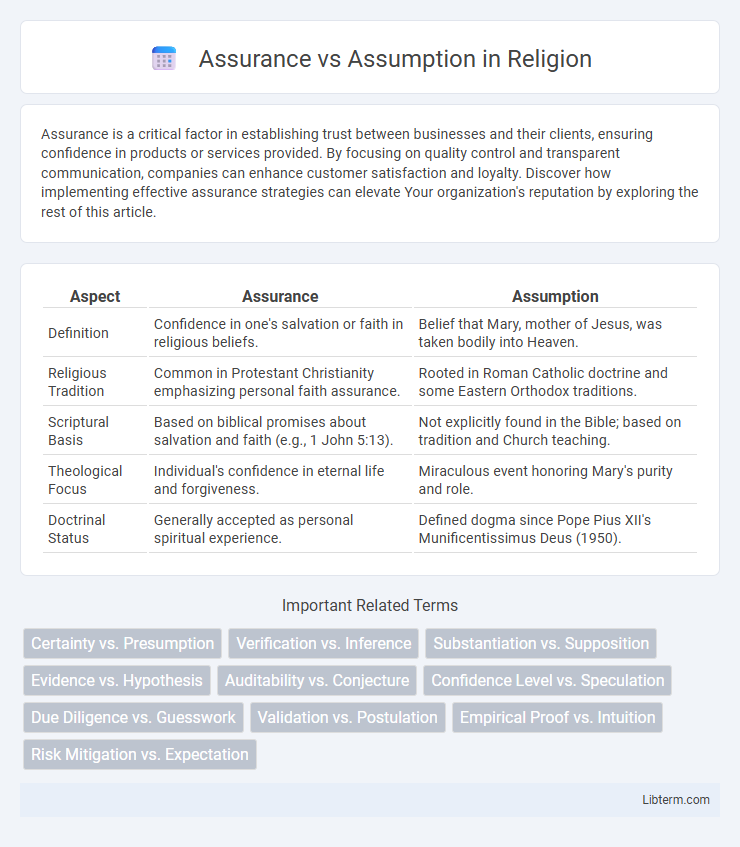Assurance is a critical factor in establishing trust between businesses and their clients, ensuring confidence in products or services provided. By focusing on quality control and transparent communication, companies can enhance customer satisfaction and loyalty. Discover how implementing effective assurance strategies can elevate Your organization's reputation by exploring the rest of this article.
Table of Comparison
| Aspect | Assurance | Assumption |
|---|---|---|
| Definition | Confidence in one's salvation or faith in religious beliefs. | Belief that Mary, mother of Jesus, was taken bodily into Heaven. |
| Religious Tradition | Common in Protestant Christianity emphasizing personal faith assurance. | Rooted in Roman Catholic doctrine and some Eastern Orthodox traditions. |
| Scriptural Basis | Based on biblical promises about salvation and faith (e.g., 1 John 5:13). | Not explicitly found in the Bible; based on tradition and Church teaching. |
| Theological Focus | Individual's confidence in eternal life and forgiveness. | Miraculous event honoring Mary's purity and role. |
| Doctrinal Status | Generally accepted as personal spiritual experience. | Defined dogma since Pope Pius XII's Munificentissimus Deus (1950). |
Understanding Assurance and Assumption
Assurance involves a confident guarantee backed by evidence or verification, ensuring that a claim or outcome is reliable and accurate. Assumption refers to accepting something as true without proof, often serving as a starting point for reasoning or decision-making. Understanding the distinction between assurance and assumption is crucial for risk management, quality control, and strategic planning in business and scientific contexts.
Key Differences Between Assurance and Assumption
Assurance involves a confident guarantee or proof that something is true, often supported by evidence or verification, while assumption is a belief accepted without proof, often used as a starting point for reasoning or decision-making. Assurance provides certainty and reduces risk by confirming facts, whereas assumptions introduce uncertainty and require validation as conditions change. Key differences also include assurance relying on factual data, and assumptions depending on hypotheses or expectations.
Definitions: What Is Assurance?
Assurance refers to the confident declaration or guarantee that certain facts or conditions are true, often supported by evidence or professional evaluation. It involves a formal process of verification, such as audits or expert assessments, to provide stakeholders with trust and reliability regarding information. The key element in assurance is the reduction of uncertainty through systematic validation, ensuring accuracy and credibility.
Definitions: What Is Assumption?
An assumption is a statement or idea accepted as true without proof, serving as a foundation for reasoning or decision-making. It often involves supposed facts or conditions that influence predictions, plans, or analyses within business, science, and daily life. Unlike assurance, which provides confidence based on evidence, assumptions rely on inferred or presumed information lacking direct verification.
Importance of Assurance in Decision Making
Assurance in decision making provides a reliable foundation by validating data accuracy and minimizing risks, which enhances confidence in chosen strategies. Unlike assumptions that rely on unverified information, assurance leverages evidence and transparency, promoting accountability and informed judgments. Organizations that prioritize assurance achieve better outcomes through reduced uncertainty and improved stakeholder trust.
Role of Assumptions in Analysis and Planning
Assumptions play a critical role in analysis and planning by providing a foundational basis for decision-making where complete information is unavailable, allowing analysts to model potential scenarios and outcomes effectively. These assumptions must be clearly defined, realistic, and regularly reviewed to ensure the integrity and adaptability of the strategic plans. Assurance, in contrast, involves validating these assumptions through data verification and risk assessment to enhance confidence in the plans and support successful execution.
Real-World Examples: Assurance vs Assumption
In software development, assurance is demonstrated through rigorous testing and code reviews ensuring functionality meets requirements, whereas assumption involves developers presuming code behavior without verification, which can lead to bugs. Aviation safety relies on assurance via thorough inspections, maintenance, and pilot training to guarantee aircraft reliability, while assumptions about weather conditions or mechanical status without data can cause critical failures. Financial auditing exemplifies assurance by verifying transaction accuracy through documented evidence, contrasting with assumptions made from incomplete or unaudited financial information leading to misinformed decisions.
Risks Associated With Relying on Assumptions
Relying on assumptions in decision-making introduces significant risks such as overlooked uncertainties, inaccurate data interpretation, and potential project failures. Unlike assurance, which provides verified evidence and confidence through audits or validations, assumptions lack empirical validation and can lead to misguided strategies. Organizations must rigorously test assumptions to mitigate risks, ensuring decisions are grounded in reliable information and reducing vulnerability to unforeseen challenges.
Building Trust Through Assurance
Building trust through assurance involves providing verifiable evidence and consistent performance to eliminate doubts and reinforce confidence. Unlike assumption, which relies on unverified beliefs, assurance uses transparent communication, documented commitments, and reliable outcomes to foster credibility. Organizations that prioritize assurance create stronger relationships by demonstrating accountability and delivering measurable results.
When to Use Assurance Over Assumption
Use assurance over assumption when certainty and verified evidence are required to support decisions, ensuring that claims or outcomes are based on reliable data rather than speculation. Assurance provides documented confidence, often accompanied by testing, validation, or audits, which is critical in risk management, quality control, and regulatory compliance. Assumptions, being unverified beliefs, are more appropriate in early hypothesis formation or when data is incomplete and contingencies are planned.
Assurance Infographic

 libterm.com
libterm.com